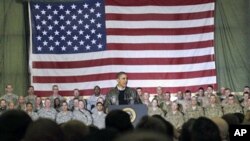NATO's top commander in Afghanistan, General David Petraeus, is reported to have told the White House that although the 30,000 troop surge has improved security in Afghanistan, Taliban insurgents remain strong in some areas. The general's reported evaluation comes days before the White House releases its review of its Afghan strategy.
Experts don't expect surprises when President Barack Obama provides his reassessment.
Obama's surprise visit to Afghanistan last week is being seen in Washington as an effort to turn around the faltering war effort. "We said we were going to break the Taliban's momentum and that's what you're doing," the president told the troops. "You're going on the offense, tired of playing defense, targeting their leaders and pushing them out of their strongholds."
Obama spoke as his advisers were finalizing a comprehensive assessment of the impact of the troop surge and the overall Afghan strategy. Afghanistan experts in Washington, though, see no sign that Mr. Obama is reconsidering the course he set last December.
Michael O'Hanlon, an analyst at the Brookings Institution, said, "Nothing fundamental about the strategy is likely to change. I think it is more important and more likely that we could see a major reassessment in the middle of 2011 because by that point you would have expected to see major change."
O'Hanlon said that by then, the impact of the troop surge will be clear. He said a policy change should involve prodding Pakistan to stop sheltering Afghan Taliban, like the militant leader Jalaluddin Haqqani and his fighters. They stage cross border attacks into Afghanistan.
"If the Pakistanis continue to tolerate the Haqqani network and the Afghan Taliban network being based on their territory, then that will be a major body blow to our efforts," said
O'Hanlon.
Lisa Curtis at the Heritage Foundation also is concerned about Pakistan and its failure to curb attacks from its soil. "There have been a plethora of reports about Pakistan's links with the Haqqani network. The Haqqani network is responsible for some of the fiercest attacks against U.S. soldiers in Afghanistan. So I think U.S. policy-makers have to ask themselves how the U.S. is benefitting from the partnership with Pakistan and the provision of billions in aid to this country."
David Rohde is a former New York Times reporter who was kidnapped by Afghan Taliban fighters. He was in captivity for more than seven months, until he escaped from a Haqqani hideout in the border region between Pakistan and Afghanistan. He said Pakistan will never shun the Taliban because it fears India's influence in Afghanistan. He supports the substance of a leaked cable from the U.S. Ambassador in Pakistan, Anne Patterson.
"She wrote, justified or not, increased Indian investment and trade with, and development support to the Afghan government, which the U.S. government has encouraged, causes Pakistan to embrace Taliban groups all the more closely," said Rohde. "And later on in that cable she says no amount of money can sever that link."
Reducing tensions between India and Pakistan, he said, is the only way to bring real stability to Afghanistan and the whole region.




